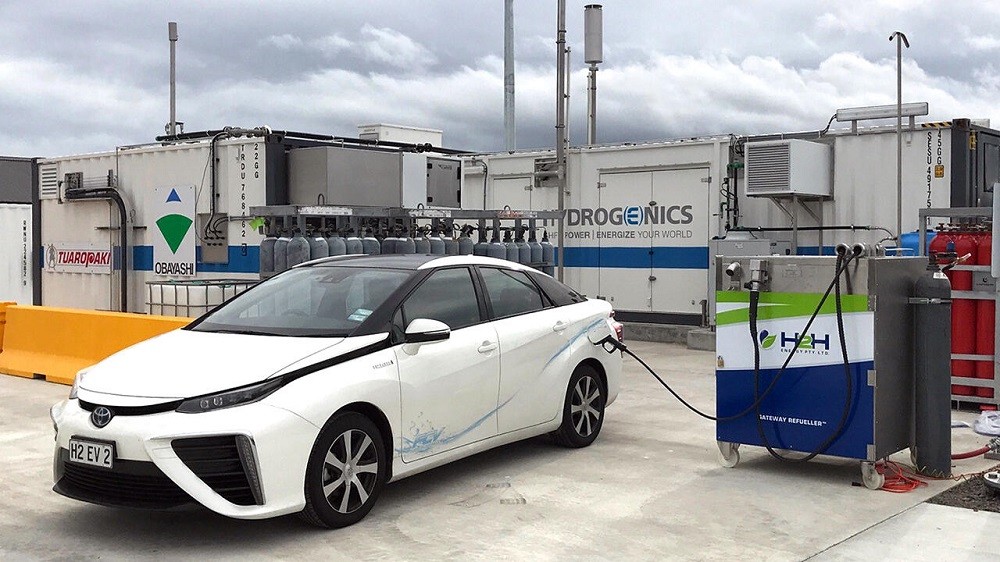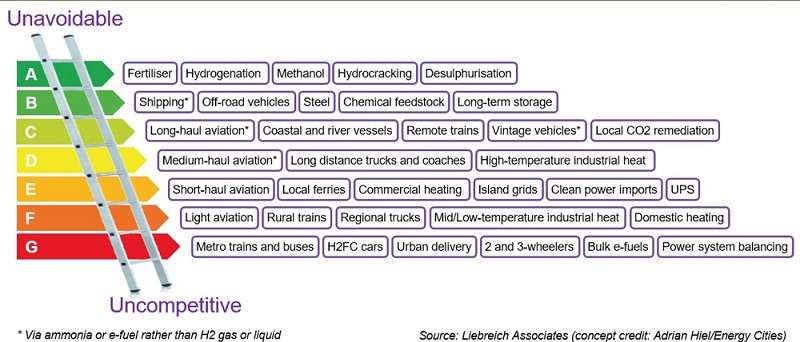|
|
|
Why does that always involve fossil fuels when it comes to hydrogen tho.
Lots of talk and plans but it all leads back to fossil fuels.
RobDickinson:
Right now that uses coal. yay for the hydrogen economy
Was thinking more of the transport of H2 produced by solar>electrolysis than from brown coal.
There are pilot solar/H2 projects in North Africa, the Middle East and Australia among others.
I'm sure this ship could transport Green, Blue or Pink hydrogen as well as Gray.
RobDickinson:
Why does that always involve fossil fuels when it comes to hydrogen tho.
Lots of talk and plans but it all leads back to fossil fuels.
No, it doesn't always lead back to fossil fuels.
Irrespective of whether hydrogen or any other fuel becomes viable for various uses/industries we need to accept the possibility that fossil fuels may be the only option for some uses.
Sony Xperia XA2 running Sailfish OS. https://sailfishos.org The true independent open source mobile OS
Samsung Galaxy Tab S6
Dell Inspiron 14z i5
RobDickinson:
Right now that uses coal. yay for the hydrogen economy
so let's sit on our hands eh?
I get it, you don't think hydrogen has a future. Others disagree and are doing something about it.
Most of the posters in this thread are just like chimpanzees on MDMA, full of feelings of bonhomie, joy, and optimism. Fred99 8/4/21
Technofreak:
No, it doesn't always lead back to fossil fuels.
Irrespective of whether hydrogen or any other fuel becomes viable for various uses/industries we need to accept the possibility that fossil fuels may be the only option for some uses.
Absolutely nothing wrong with ICE on fossil fuels. Petrol contains a lot of energy and ICE technology is well-developed. The problem is the way they have been used. We don't need them for most mass transport and other applications. For niche uses, specialty tractors and that kind of thing, they may well be the best option. If their use is limited, it doesn't cause a problem the planet can't handle.
Plesse igmore amd axxept applogies in adbance fir anu typos
elpenguino:
I get it, you don't think hydrogen has a future. Others disagree and are doing something about it.
Thats not what I think at all, but we are in a crisis and plans for /something/ in 2050 is just spin
https://cleantechnica.com/2021/12/07/shrinking-hydrogen-demand-hydrogen-decarbonization-will-have-major-climate-benefits/
"At present, black and grey hydrogen from coal and natural gas account for over 99% of hydrogen manufacturing, with 20-35x and 8-10x as much CO2 as the mass of hydrogen resulting."
"To put this in context, just manufacturing hydrogen today creates around as much CO2e as all global aviation in 2019. That sector will decline substantially in emissions through 2100 as well, but it won’t be doing it with hydrogen-powered airplanes."
"This is why hydrogen is a climate problem, not a climate solution."
RobDickinson:
https://cleantechnica.com/2021/12/07/shrinking-hydrogen-demand-hydrogen-decarbonization-will-have-major-climate-benefits/
"At present, black and grey hydrogen from coal and natural gas account for over 99% of hydrogen manufacturing, with 20-35x and 8-10x as much CO2 as the mass of hydrogen resulting."
"To put this in context, just manufacturing hydrogen today creates around as much CO2e as all global aviation in 2019. That sector will decline substantially in emissions through 2100 as well, but it won’t be doing it with hydrogen-powered airplanes."
"This is why hydrogen is a climate problem, not a climate solution."
Using current technologies absolutely agree. But tech development takes time. It's taken ~150 years for BEVs to reach their current level of technology, which is still underwhelming for many use cases.
Green hydrogen is technically feasible - generation, storage and conversion into out of ammonia. Just needs to be develop to be commercially viable. Yes right now hydrogen vehicles are being tested with dirty hydrogen. The vehicles being developed will work just as well with green hydrogen. Small potatoes in the big scheme of things.
Research into GH2 doesn't seem to be slowing uptake of BEVs by those that have a use case for them. Affordability, performance and govt issued sticks and carrots seem to be the main drivers of BEV uptake.
Mike
RobDickinson:
https://cleantechnica.com/2021/12/07/shrinking-hydrogen-demand-hydrogen-decarbonization-will-have-major-climate-benefits/
"At present, black and grey hydrogen from coal and natural gas account for over 99% of hydrogen manufacturing, with 20-35x and 8-10x as much CO2 as the mass of hydrogen resulting."
"To put this in context, just manufacturing hydrogen today creates around as much CO2e as all global aviation in 2019. That sector will decline substantially in emissions through 2100 as well, but it won’t be doing it with hydrogen-powered airplanes."
"This is why hydrogen is a climate problem, not a climate solution."
The second article you linked explains why according to the writer that fossil fuels, bio fuels and hydrogen are not long term options for aviation and basically because of those conclusions proves that battery aircraft will be the solution. The big flaw in his argument is nowhere in that article does he bother to explain how batteries will become energy dense enough to be commercially viable.
Right now from an emissions point of view hydrogen is worse than fossil fuels. Just as batteries are an absolutely useless commercial proposition for aviation. Both technologies require significant development before they can successfully replace fossil fuels in aviation use.
My money is on hydrogen being ready for commercial use in aviation before batteries are viable.
RobDickinson: Thats not what I think at all, but we are in a crisis and plans for /something/ in 2050 is just spin
It's my bet batteries won't be ready to commercially replace fossil fuel in aviation before 2050. So I guess the talk of using batteries is just spin too.
Sony Xperia XA2 running Sailfish OS. https://sailfishos.org The true independent open source mobile OS
Samsung Galaxy Tab S6
Dell Inspiron 14z i5
MikeAqua:
Australia’s first commercial green hydrogen station set for Melbourne (theage.com.au)
It's small steps like these that will, in due course, become mainstream.
The march towards clean energy can't be stopped, nor should it be. It's already become cheaper than traditional fossil fuel solutions in some areas. For the interim, we should stick with fossil fuel in aviation and other areas where it is the only realistic option until usable alternatives come along, but removing the truly staggering government subsidies for the fossil fuel industry will go a long way to driving adoption of energy solutions that won't end up with us hitting that 2° scenario.
From https://rethinkdisruption.com/carbon-tax-fossil-fuel-bailout/
... when using accurate data for the levelized cost of electricity (LCOE), solar, wind and batteries are already cheaper than conventional energy in most regions of the world, which is getting more expensive with time. This means that fossil fuel generation assets are already vastly over-valued and will never meet hoped for returns.
What keeps societies locked-in to burning coal, oil and gas are utility monopolies supported by $6 trillion dollars a year (or $11 million a minute) of government subsidies – without which these industries would collapse under their own economic dead-weight.
Get your business seen overseas - Nexus Translations
Gurezaemon:
MikeAqua:
Australia’s first commercial green hydrogen station set for Melbourne (theage.com.au)
It's small steps like these that will, in due course, become mainstream.
I hope so. The way I see it we have multiple energy sources now, it's probably good to have a few irons in the fire for clean vehicles. Especially some of the use cases where batteries won't cut it and the choice is between biofuels or gH2.
Mike
Tuaropaki Trusts' been involved in a wide range of joint ventures - from being a satellite internet provider to investment in 2degrees and hydroponic greenhouse production – they're even North Americas' largest wasabi producer here in Canada.
One of their main assets is a geothermal power station at Mokai near Taupo - I was lucky enough to get a look at it a few years back – where they’re now producing hydrogen in New Zealand's first megawatt-class green H2 production facility.
They don’t say exactly what gear they’re using, except that it’s a proton exchange membrane (PEM) electrolyser .
But their publicity picture’s worth a thousand words.

Behind the obligatory FCEV - a Mirai, refuelling from a 35/70 MPa H2H Gateway Refueler (the same refueler POAL's using, for now with H2 from BOC's green hydrogen plant in Glenbrook) is some neat equipment.
There's a 40' containerised Cummins/Hydrogenics Electrolyser, likely a HyLYZER-250 capable of producing 250 Nm3/h (normal m3 per hour), feeding a compressor/storage system, and high pressure H2 cylinder filling station.
The FCEV car's a bit of a red herring.
There's no way they're producing Hydrogen at such a low cost that - by itself - a vehicle on the lowest rung of the Hydrogen Totem Pole would be competitive with BEV's.
Assuming subsidies, a more viable use would be to start decarbonizing the tanker fleet that services over 100 suppliers within 80km of their Miraka factory - which they claim has one of the "lowest dairy processing carbon footprints in the world"
They've gone to a lot of effort to document the carbon emissions of their dairy suppliers, and with their new (ex Fonterra) CEO looking to "add more value" to their existing production there's got to be a high value niche in certified low carbon 'gate to plate' dairy production.
By Hydrogen Totem Pole I’m thinking of Michael Liebreich’s (producer of 2010’s alarmist “First They Ignore You” and founder of Bloomberg New Energy) visualization of a Hydrogen ladder..

I’d agree with his assessment of the upper and lower ends.
Electrification doesn’t work for fertilizer, steel, glass and cement because of the way they’re produced
At the other end their simplicity, conversion efficiency and diverse charging options for BEVs’ mean they’re by far the most likely future of light/medium transportation.
The positioning of industries on the centre rungs is more mobile – any of the looming advances in battery or H2 tech could push a bunch of them off towards either end.
It also ignores subsidies. With the addition of enough free money Hydrogen can temporarily fill any position on the ladder.
In some countries – like New Zealand – unlikely to produce our own batteries, and with lots of renewable energy potentially available for H2 production, regional trucking might be a rung higher.
Also for long-haul freight, hydrogen fuel cell trucks, particularly with ranges of more than 600km, and depending on the production cost of hydrogen, may be a viable path to GHG reduction.
https://cleantechnica.com/2021/12/22/0-03-of-hydrogen-is-green-hydrogen/
"The new report indicates that “water electrolysis made up ~0.03%” of global hydrogen production last year."
|
|
|
